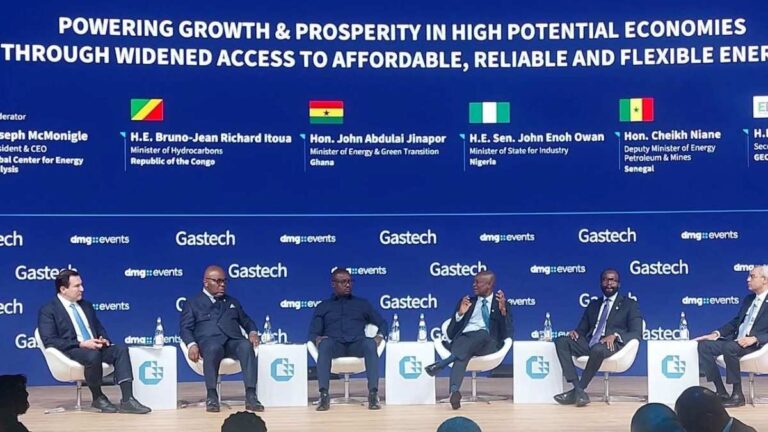Nigeria has unveiled a bold industrial roadmap aimed at more than doubling the sector’s share of national output over the next decade, projecting a rise from the current 10% contribution to 25% of GDP by 2035.
The plan was highlighted at the Gastech Exhibition and Conference in Milan, where Minister of State for Industry, Senator John Owan, described the framework as a defining milestone of President Bola Tinubu’s administration.
From resource-driven to production-driven economy
Owan told participants that the policy signals Nigeria’s transition away from a resource-dependent economy toward a competitive, innovation-led industrial hub. “This is the first time in decades that Nigeria has adopted a comprehensive industrial framework,” he said, adding that the move is expected to reshape the country’s growth trajectory.
He credited President Tinubu’s early reforms — including fuel subsidy removal and exchange rate unification — with stabilising the economy and creating conditions for investment. Tinubu, he said, has consistently pitched Nigeria as an investment destination during global forums, underscoring his belief that Africa represents the next frontier of industrial growth.
Gas at the centre of the strategy
Energy is central to Nigeria’s new industrial vision, with natural gas positioned as the backbone of expansion. Owan reaffirmed Tinubu’s support for Compressed Natural Gas (CNG) as a driver of industrial competitiveness, while noting that infrastructure gaps continue to limit progress.
He urged global partners to work with Nigeria to bridge those gaps, stressing that the country remains “more of a gas nation than an oil nation.”
Echoing this view, Olalekan Ogunleye, Executive Vice President for Gas, Power and New Energy at NNPC Limited, said the state-owned company is revising the national gas master plan to align with long-term industrial and export goals.
“Nigeria holds more than 210 trillion cubic feet of gas. Optimising this resource is critical to powering industries, creating jobs, and positioning the country as a reliable global supplier,” Ogunleye said.
Expanding capacity and building partnerships
He noted that the Train 7 expansion of Nigeria LNG is already set to increase output by 30%, with groundwork being laid for potential Train 8 and Train 9 projects. In addition, the African Atlantic Gas Pipeline — a joint project with Morocco — is expected to link 16 economies and deepen regional integration.
Domestically, NNPC is stepping up its support for gas-based manufacturing, which Ogunleye said has already attracted renewed interest from international investors in deep-water gas projects.
“Fiscal incentives are reshaping the market. We are seeing companies return, and that is proof that Nigeria is becoming one of the most competitive destinations for gas investment,” he added.
Looking ahead
With reforms in motion and new frameworks validated, the government insists the next decade will be defined by industrial expansion, energy optimisation, and global partnerships.
“There is no better moment in Nigeria’s history than now,” Owan concluded. “We are ready for transformation, and the world should engage with us.”


